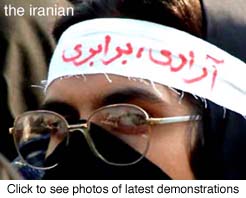
 . .
|
|
Challenging the Government of God Understanding the reform movement in Iran is predicated upon understanding the particular brand of Islamic fundamentalism which it aims to modify. There is a lot that is unique about Iranian fundamentalism but it nonetheless must be seen as one of the Abrahamic revivalisms of the twentieth century. As ideologies of marginal groups spurned by modernity, Jewish, Christian and Islamic
fundamentalisms oppose the intellectual legacy of modernity and any attempt to arrive
at religious compromises with it. They also share agendas of political domination
based on a shared temptation for theocracies. Having pointed out the general areas
of overlap let us examine the unique aspects of the Iranian fundamentalism and its
reformist antithesis. By contrast, Islamic and especially Iranian fundamentalists have synthesized a variety of Western and non-Western ideas in their attempts to adumbrate and defend the revival of a political ummah. They have expropriated aspects of such Western and yet anti-liberal ideas as Marxism, fascism, syndicalism, national-socialism (and more recently, post-modernism) for concocting their own nativist syntheses. When Marxism was hot, the forerunners of Islamic fundamentalism in Iran did not hesitate to ransack its Culture of Critical Discourse. They even attempted to beat the Marxists at their own game. In a treatise entitled "The Allure of Materialism" (Elal-e Gerayesh be Maddigari) the late Ayatollah Morteza Motahari identified the revolutionary rage as part of the attraction of Materialism and charged Muslim activists with the task of recapturing "the bunkers of aggressiveness" (Sangar-haye Parkhash-gari). Subsequently, the People's Mujahedeen Organization proposed to wage a designer Jihad against the Shah, cloning the Marxist Fedaeen's vanguard "Guevarist" ideology. Iran's post-Revolutionary anti-Americanism that led to such epoch making events
as the hostage crisis of 1979 was also born of the same ideological promiscuity.
In short, the Iranian fundamentalism has been innovative and wildly eclectic. By
contrast, the Iranian reform movement equates eclecticism with obscurantism. It declares
the concocted syntheses of Islam and Western systems defunct and calls for a transparent
system based on unhyphenated modern concepts (e.g., democracy, personal liberties
and human rights). The deliberate confusion of the legacy of modernity with that of Western hegemony
has served and still serves the interests of Islamic fundamentalists. Iranian reformists
are at pains to decouple modernity from its imperialist carriers. While defending
national and cultural autonomy of Muslims, they call for facing the challenge of
modernity. The intellectual reform movement recognizes that Islam remains a pre-enlightenment religion. It asks: what would it take for Islam to come to terms with the paradigm shift in political arrangements of modernity that posits a rights-based, social-contracterian, secular framework for private and public life? Of course, dozens of Islamic reformers from Mohammd Iqbal Lahouri to Fazl ur-Rahman have approached the task. But enlightened thinkers a reform movement do not make. It took events such as the thirty-year wars to gradually crystallize the Christian accommodation to secularism and tolerance. Nor did Reform Judaism spring forth from the philosophies of Baruch Spinoza (1632-1677) and Moses Mendelssohn (1729-1786). It took the ferment of the German and American social conditions of the 19th century (e. g. , emancipation from medieval ghettos and the unprecedented liberties of the new world) as well as the prodigious intellectual and organizational abilities of leaders like Abraham Geiger (1810-74) and Isaac Mayer Wise (1819-1900) to reconstitute a post-enlightenment Judaism. The reform movement in Iran is unique in the Islamic world because it is not driven
by the genius of a few intellectuals. On the contrary; it is the disenchantment of
the Iranian masses with the government of God that is "channeled" by the
reform intellectuals. The demands of the reform movement in Iran go beyond political
reform, democracy and human rights. It aims for nothing less than a redefinition
of religion in the context of a secular social, cultural and political system >>>
Photos student
protests The critical appraisal of Islamic fundamentalism in Iran was effective because it was a self-critique by ex-members, rather than an attack by non-members. The Iranian reform resulted from disaffections of successive segments of the formerly committed elites of the Islamic Republic during such episodes as the taking of the American hostages, the Cultural Revolution, the pursuit of the aggressive phase of the Iraqi campaign and the execution of the imprisoned Mojahedeen at the end of the war. Each of these events produced a liminal wave of disenchantment whose butterfly effects later appeared as the intellectual and political storms that brought Mohammad Khatami to power in 1997.
Abdolkarim Soroush and Sadegh Ziba Kalam the renowned intellectuals of the reform
movement were involved at the highest levels of the Cultural Revolution. Some of
the reformers, including the dissident Ayatollah Hossein-Ali Montazeri witnessed
the summary executions of thousands of imprisoned Mojahedeen. As ex-radicals, the
leaders of the reform movement in Iran are naturally averse to quick and radical
change. And yet, the pitch of the reformist censure of the Islamic Republic has dramatically
increased during Khatami's second presidency. The right wing backlash to Khatami's election started as soon as it recovered from a one year period of confused hibernation, with the arrest and trial of Gholam-Hossein Karbaschi, (the reformist mayor of Tehran) and the assassination of Said Hajjarian (the main architect of the reform politics.) In the words of Morteza Mardiha, the right wing thus eradicated the twin symbols of modernization and modernity. Then came the summer of 1999 when the right-wing went on a rampage and shut down three quarters of the reformist media in one fell swoop and brutalized the students who had demonstrated against the closures. In the next three years the right-wing counterattack continued with the arrest and imprisonment of reformists on trumped-up charges of treason and the systematic emasculation of the reform parliament by the veto power of the Council of Guardians as well as the "executive decree" of the Supreme Leader Ali Khamenei.
Of course, even if the twin measures would become law; this modest achievement would not counterbalance Khatami's above mentioned sins of omission and his sins of commission -- e. g., his preemptive surrender at the outset of his second term evident in his shocking choice of a non-reformist cabinet. The irony is that public opinion polls show that Khatami is still regarded as
a paragon of morality. One wishes that his familiarity with Western thinkers had
extended to the realist political philosophers from Machiavelli to Weber who teach
that the exercise of political power calls for a different sort of morality. Private
virtues, (like meekness) could turn into public vices. Running to the moral high-ground
from the consequences of one's political failures is to climb the heights of political
irresponsibility. It is indeed an ominous development that the tenor of the voluminous indictment delivered by the prosecutor Ali Asghar Tashakkori against Ghazian has all the earmarks of the secret bulletins put out by the late Saeed Emami and his assistants at the Ministry of Intelligence (who were later arrested as the government's "rouge elements" and found guilty as murderers of dissident intellectuals.) The propaganda arm of the same team had simultaneously launched a campaign of
defamation against a number of academics and intellectuals in a series of programs
broadcast on the National Iranian Television entitled Hoviyat (Identity).
By including the names of a number of academics and intellectuals (including that
of the author) as Ghazian's co-conspirators it is not far fetched to assume that
a new campaign is being launched in order to intimidate dissidents. The death sentence
handed down to the prominent reformer Dr. Aghajari was integral to the new wave of
the right-wing backlash. Both wings of the most important reform organization of the university students,
(Office for Fostering Unity) denounced the sentence against Aghajari. Even a branch
of the right-wing "Mobilization" (Baseej) at the Amir Kabir University
condemned the death sentence. The widespread protests finally succeeded to force
the Supreme Leader Khamenei to order an appeals court to reconsider Aghajari's death
sentence in the light of the religious axiom of the sanctity of life. Political reformers appeared deadlocked, soundly beaten and greatly rankled by
the prospect of losing both face and power at the end of Khatami's second term. Just
then, the protests against the death sentence of Dr. Aghajari brought the reformers
both new hope and the possibility of a respectable exit in the form of mass resignations.
They have been given one more chance to prove that they have not been complicit in
the right-wing's brutalization of Iranians, and that they live "for politics"
rather than "off" it. Other freelance reform intellectuals who are not involved in the government or parliament have been pushing the envelope in other directions. Akbar Ganji's Manifest of Republicanism is the case in point. This manifesto (and, to a lesser extent, Hashem Aghajari's strident, anti-clerical lecture on Islamic Protestantism) must be studied not only for their content but also in social psychological terms as exemplifying Iran's new antinomian spirit. Both Ganji and Aghajari have been likened to Salman Rushdie by right wing clergy. This comparison is sound in ways unforeseen by its authors. Rushdie's alleged heresy is prefigured in his Satanic Verses in the behavior of his main character Gabreel Farishtah. Farishta's first act of rebellion is garish and spectacular. He gorges himself with a variety of forbidden pork to celebrate his liberation from the strictures of his faith. He screams: "spewing sausage fragments from the corners of his mouth. "No thunderbolt!" There is no punishment!
Author

|
|
Web design by Bcubed
Internet server Global Publishing Group







































